The 2023 PDST (Professional Development Service for Teachers) Young Economist of the Year (YEOTY) awards took place on Friday 28 April in the O’Reilly Hall in UCD.
These national awards are an initiative of the PDST, which is the largest teacher support service in Ireland serving approximately 35,000 post-primary teachers (of which approximately 1,500 are business and economics teachers).
Celebrating ten years
2023 celebrates the PDST Young Economist of The Year’s 10th anniversary. Speaking about this significant milestone, Dr Rachel Farrell - who is based in UCD’s School of Education and is chairperson of the YEOTY - says it has taken the programme this long to develop into what we see today: a celebration of more in-depth thinking about the application of economics into every day life.
“When we started ten years ago, students were taking things from a textbook and trying to make it look interesting,” she explains.
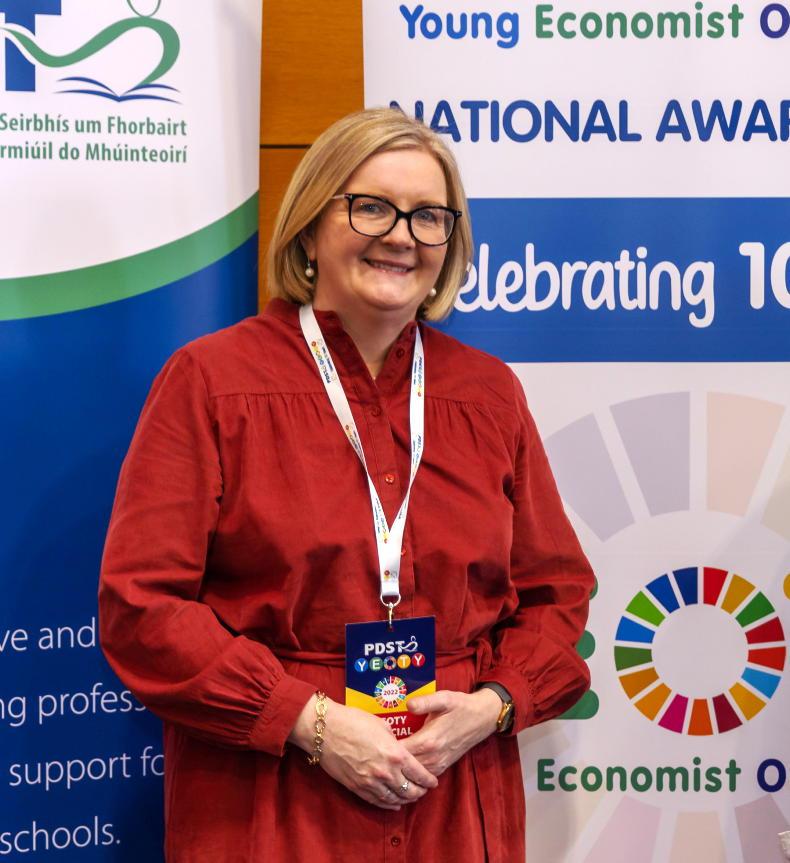
Dr Rachel Farrell, UCD School of Education and Chair of the YEOTY. Photo credit: Paul Moore
“There is a huge difference between the type of projects that were displayed at the event 10 years ago compared to the projects submitted this year.”
She adds, “Some people have a misconception of what economics is about.”
About the programme
The essence of the programme is that students participate in the planning, development and evaluation of inquiry-focused projects and activities. This means they develop a project based around several potential themes (like de-globalisation, war, or broken supply chains), which are set by the organisers. The students are then judged based on the quality of their investigation and economic analyses.
Each year economics teachers across the country attend a professional learning day organised by the PDST in association with members of the Irish Economics Association (IEA) to learn about the latest developments in economics. Teachers then work with students on inquiry-based projects to be submitted to the annual YEOTY competition.
Rachel outlines the development of the programme and the impact it has had over the last ten years.
“[When the YEOTY awards began], I was a [secondary school] teacher; teaching economics,” she says. “I found that my students were always talking about the young scientist of the year, and I was thinking: ’Why is there no [young] economist of the year?’”
Rachel started working with PDST on a team that travels around to schools to support teachers with literacy and numeracy strategy. “I pitched [the idea of a YEOTY competition] to my boss and we got funding from the Department of Education.”
Students tackling social issues
Circularity and a Sustainable Ireland
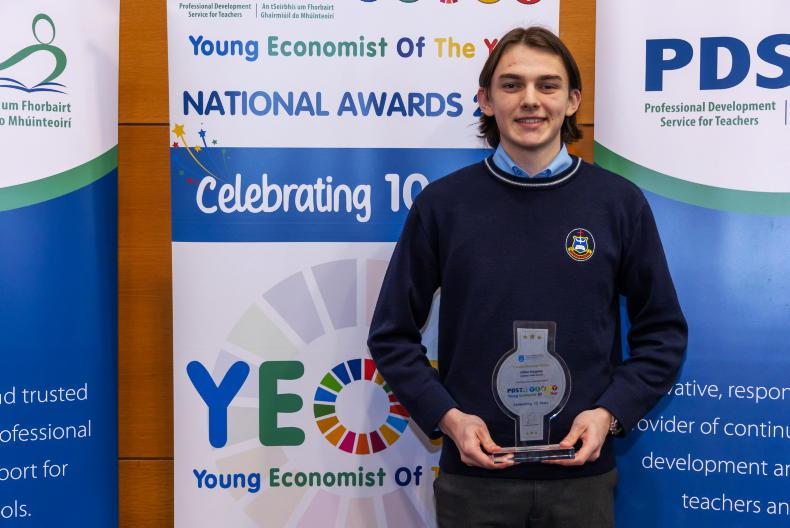
Cillian Duignan, circular economy winner from Coláiste Choilm, Swords. Photo credit: Paul Moore
Circular economy awardee, Cillian Duignan, a sixth-year student in Coláiste Choilm, Swords, looked at the concept of the circular economy. This is his second successive year participating in the YEOTY. His project was based on using a circular economy approach to help provide sustainability in Ireland.
Inspired by his study of the OECD [The Organisation for Economic Co-operation and Development] survey on the circular economy in cities and regions’ 3Ps framework (people, places, policies), Cillian sought to establish how links could be created across environmental, regional, agricultural and industrial policies. He concluded that the development of a bioeconomy has the potential to deliver the objectives of the 3Ps.
“Last year I also did a project on the circular economy after reading an article on it, I saw the potential for it,” he tells Irish Country Living. “It was the sustainability aspect as the potential solution for the different problems we are facing environmentally.”
After completing a case study on hydroponic farming with Emerald Greens, (a large vertical farm located in Co Tipperary), Cillian found there are a lot of innovative farming methods that can be used to help maximise the potential of a circular model.
“Vertical farming seems to be a really innovative method,” he says. “They can produce year-round and there is a lot less water and soil needed. There are concerns with set-up costs at the moment but I think if the Government can help support with policies and grants, vertical farming could have big potential in the country.”
The Climate Economy Conundrum
Northern Ireland Medal winner
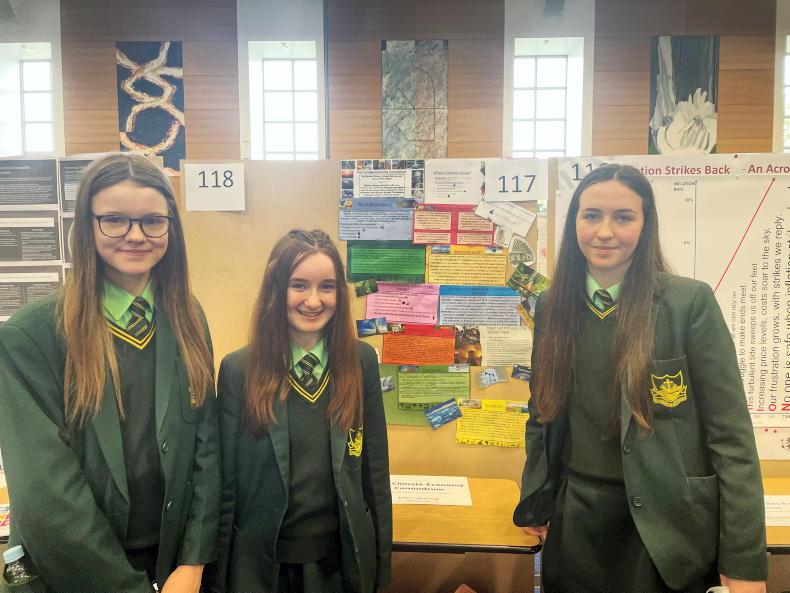
Eleanor Dunne, Lauren McSwiggan and Orlagh McEvoy, Northern Ireland Medal winner's from Sacred Heart Grammar, Newry
Eleanor Dunne, Lauren McSwiggan and Orlagh McEvoy are Year 11 students at Sacred Heart Grammar in Newry.
They decided to tackle the “climate economy conundrum” due to the recent approval of the Willow Project to allow oil drilling in Alaska, which if completed will release an additional 9.2 million metric tons of carbon pollution into the atmosphere each year.
“[American President Joe] “Biden had approved the Willow Project recently, so we decided it would be good to do a project on it so people would understand why it is bad,” Lauren explains.
“A lot of things about the Willow Project will improve the economy, so we focused on other climate [issues] - like the tornado in Alabama - to show that just because the Willow Project improves the economy, [it might cause other problems].”
The students showed how climate change has caused critical damage to both the earth and the economy.
DRS- Can money-back economics deliver change for good?
Environmental sustainability award
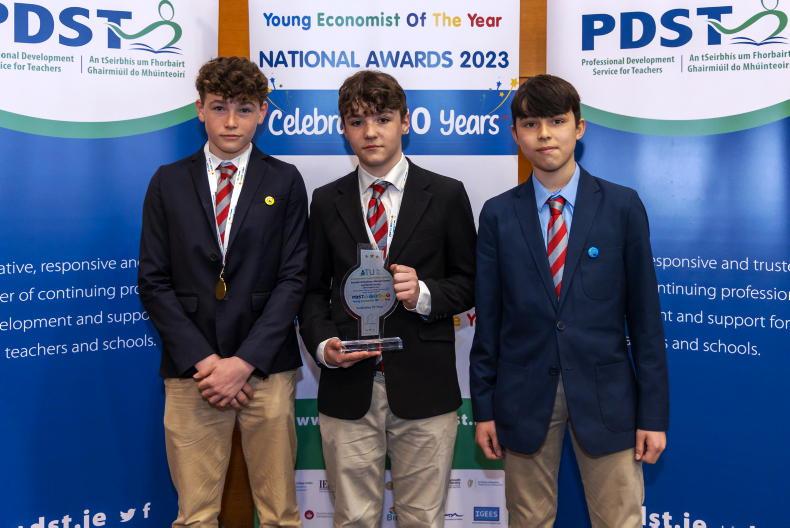
Benedict O’Sullivan, Michael Owens and Kevin Cooney, winners of the environmental sustainability award from Glenstal Abbey School , Co Limerick. Photo credit: Paul Moore
Benedict O’Sullivan, Michael Owens and Kevin Cooney are 1st years in Glenstal Abbey School in Limerick.
This group completed a project based on a deposit return scheme; questioning if money-back economics can deliver change for good. The group’s YEOTY project quantifies the annual environmental benefits of Ireland’s upcoming Deposit Return Scheme (DPS), its impact in recycled PET (polyethylene terephthalate) plastic pricing and considers the economics of installing a reverse vending machine in their school. The students found that, from a school of their size with 250 students, they would instead recommend using a manual collection point to maximise the value of charitable donations.
“The manual bottle scheme is cheaper for us to implement in our school and it will save a lot of energy,” says Benedict.
More info
Learn more about the Young Economist of the Year awards at youngeconomist.ie.
The 2023 PDST (Professional Development Service for Teachers) Young Economist of the Year (YEOTY) awards took place on Friday 28 April in the O’Reilly Hall in UCD.
These national awards are an initiative of the PDST, which is the largest teacher support service in Ireland serving approximately 35,000 post-primary teachers (of which approximately 1,500 are business and economics teachers).
Celebrating ten years
2023 celebrates the PDST Young Economist of The Year’s 10th anniversary. Speaking about this significant milestone, Dr Rachel Farrell - who is based in UCD’s School of Education and is chairperson of the YEOTY - says it has taken the programme this long to develop into what we see today: a celebration of more in-depth thinking about the application of economics into every day life.
“When we started ten years ago, students were taking things from a textbook and trying to make it look interesting,” she explains.

Dr Rachel Farrell, UCD School of Education and Chair of the YEOTY. Photo credit: Paul Moore
“There is a huge difference between the type of projects that were displayed at the event 10 years ago compared to the projects submitted this year.”
She adds, “Some people have a misconception of what economics is about.”
About the programme
The essence of the programme is that students participate in the planning, development and evaluation of inquiry-focused projects and activities. This means they develop a project based around several potential themes (like de-globalisation, war, or broken supply chains), which are set by the organisers. The students are then judged based on the quality of their investigation and economic analyses.
Each year economics teachers across the country attend a professional learning day organised by the PDST in association with members of the Irish Economics Association (IEA) to learn about the latest developments in economics. Teachers then work with students on inquiry-based projects to be submitted to the annual YEOTY competition.
Rachel outlines the development of the programme and the impact it has had over the last ten years.
“[When the YEOTY awards began], I was a [secondary school] teacher; teaching economics,” she says. “I found that my students were always talking about the young scientist of the year, and I was thinking: ’Why is there no [young] economist of the year?’”
Rachel started working with PDST on a team that travels around to schools to support teachers with literacy and numeracy strategy. “I pitched [the idea of a YEOTY competition] to my boss and we got funding from the Department of Education.”
Students tackling social issues
Circularity and a Sustainable Ireland

Cillian Duignan, circular economy winner from Coláiste Choilm, Swords. Photo credit: Paul Moore
Circular economy awardee, Cillian Duignan, a sixth-year student in Coláiste Choilm, Swords, looked at the concept of the circular economy. This is his second successive year participating in the YEOTY. His project was based on using a circular economy approach to help provide sustainability in Ireland.
Inspired by his study of the OECD [The Organisation for Economic Co-operation and Development] survey on the circular economy in cities and regions’ 3Ps framework (people, places, policies), Cillian sought to establish how links could be created across environmental, regional, agricultural and industrial policies. He concluded that the development of a bioeconomy has the potential to deliver the objectives of the 3Ps.
“Last year I also did a project on the circular economy after reading an article on it, I saw the potential for it,” he tells Irish Country Living. “It was the sustainability aspect as the potential solution for the different problems we are facing environmentally.”
After completing a case study on hydroponic farming with Emerald Greens, (a large vertical farm located in Co Tipperary), Cillian found there are a lot of innovative farming methods that can be used to help maximise the potential of a circular model.
“Vertical farming seems to be a really innovative method,” he says. “They can produce year-round and there is a lot less water and soil needed. There are concerns with set-up costs at the moment but I think if the Government can help support with policies and grants, vertical farming could have big potential in the country.”
The Climate Economy Conundrum
Northern Ireland Medal winner

Eleanor Dunne, Lauren McSwiggan and Orlagh McEvoy, Northern Ireland Medal winner's from Sacred Heart Grammar, Newry
Eleanor Dunne, Lauren McSwiggan and Orlagh McEvoy are Year 11 students at Sacred Heart Grammar in Newry.
They decided to tackle the “climate economy conundrum” due to the recent approval of the Willow Project to allow oil drilling in Alaska, which if completed will release an additional 9.2 million metric tons of carbon pollution into the atmosphere each year.
“[American President Joe] “Biden had approved the Willow Project recently, so we decided it would be good to do a project on it so people would understand why it is bad,” Lauren explains.
“A lot of things about the Willow Project will improve the economy, so we focused on other climate [issues] - like the tornado in Alabama - to show that just because the Willow Project improves the economy, [it might cause other problems].”
The students showed how climate change has caused critical damage to both the earth and the economy.
DRS- Can money-back economics deliver change for good?
Environmental sustainability award

Benedict O’Sullivan, Michael Owens and Kevin Cooney, winners of the environmental sustainability award from Glenstal Abbey School , Co Limerick. Photo credit: Paul Moore
Benedict O’Sullivan, Michael Owens and Kevin Cooney are 1st years in Glenstal Abbey School in Limerick.
This group completed a project based on a deposit return scheme; questioning if money-back economics can deliver change for good. The group’s YEOTY project quantifies the annual environmental benefits of Ireland’s upcoming Deposit Return Scheme (DPS), its impact in recycled PET (polyethylene terephthalate) plastic pricing and considers the economics of installing a reverse vending machine in their school. The students found that, from a school of their size with 250 students, they would instead recommend using a manual collection point to maximise the value of charitable donations.
“The manual bottle scheme is cheaper for us to implement in our school and it will save a lot of energy,” says Benedict.
More info
Learn more about the Young Economist of the Year awards at youngeconomist.ie.









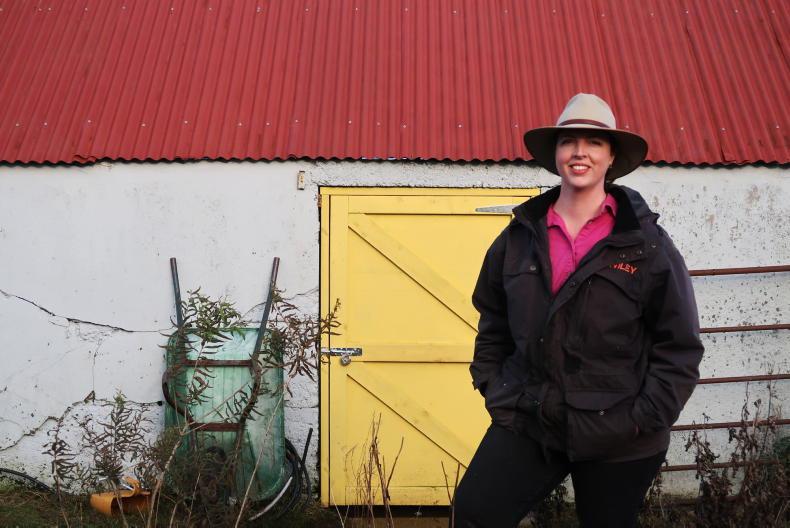
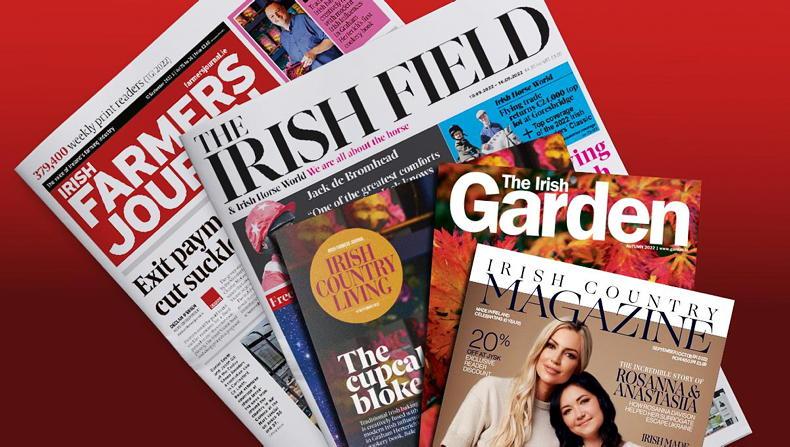
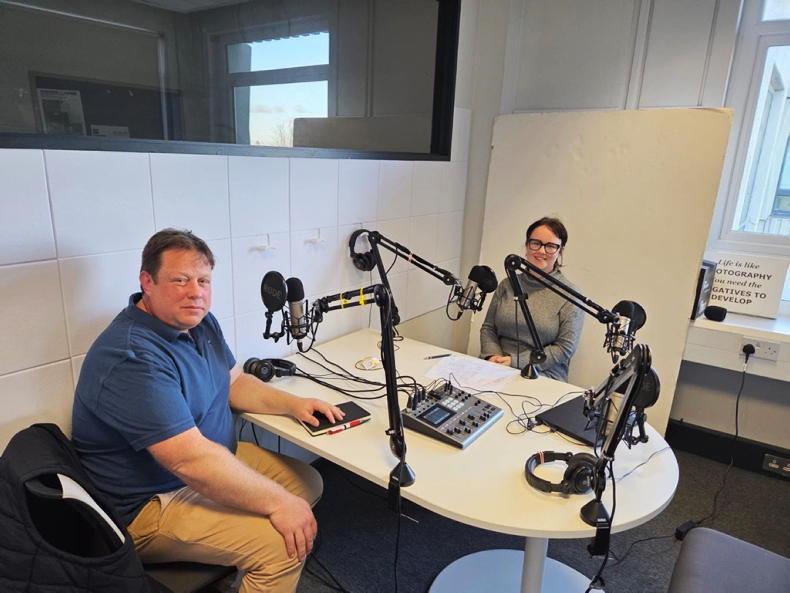
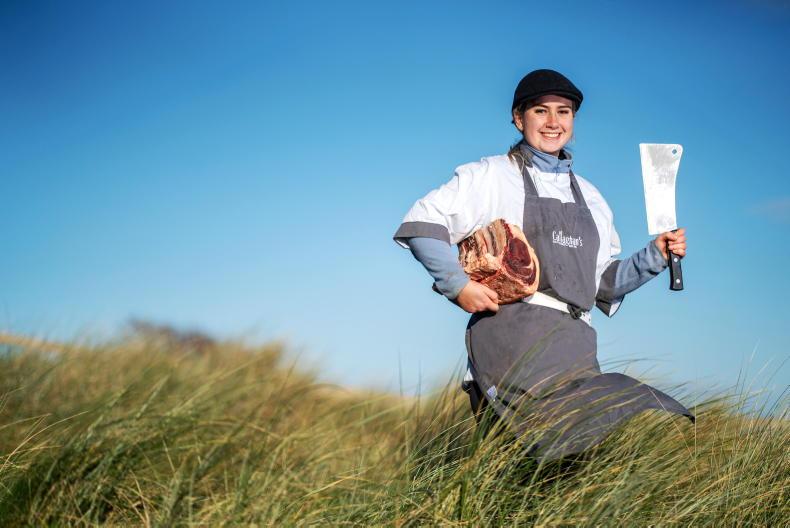
SHARING OPTIONS